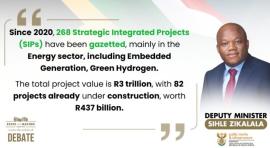
Public Works Deputy Minister Sihle Zikalala has highlighted that since the 2024 State of Nation Address (SONA), the Infrastructure Fund (IF) and its strategic partners have made great strides in the infrastructure landscape.
“Seven more blended finance projects with a capital value of R37.8 billion have been added to the IF pipeline as noted by the President in the SONA last week,” Zikalala said.
In his debate on the State of the Nation Address, held in Cape Town on Tuesday, Zikalala said under the 6th Administration in 2020, 62 projects or programmes, were gazetted as SIPs [Strategic Integrated Projects] with an additional seven programmes gazetted as SIPs in 2022.
“Taking into account the various programmes gazetted as SIPs, we have approximately 268 individual projects gazetted as SIPs, which are dominated by the energy sector under the Embedded Generation Programme, the Green Hydrogen Programme and the various bid windows and preferred bidders, as announced by the DMRE [Department of Mineral Resources and Energy] and the Minister of Electricity and Energy [Kgosientso Ramokgopa],” Zikalala said.
Zikalala revealed that the total value of these projects is estimated at around R3 trillion, with 82 projects already under construction, valued at approximately R437 billion.
“Government commitment for these projects is estimated at around R13.8 billion over the 2025 medium-term, comprising of bespoke and innovative first loss capital grant finance, short and long-term viability gap and project derisking debt instruments. The associated financial additionality from the private sector and public equity contributions is estimated at around R24.2 billion,” Zikalala said.
Bespoke refers to something that is custom-made or tailored specifically to the needs or preferences of an individual. It is often used in contexts like clothing (e.g., bespoke suits), but can apply to anything that is made to order or specially designed.
Zikalala said going forward, government will enhance project preparation by easing regulations affecting Public Private Partnerships (PPPs) and further ensure a quicker turn on PPPs implementation unit, while National Treasury continues with its overall monitoring to avoid potential corrupt practices.
“This will ensure an increase in investment in all infrastructure which in turn will lead to the growth of Gross Capital Formation, which is the primary feature of our country’s balance sheet while creating more skills and sustainable jobs.
“As a developmental state, our approach on infrastructure development is not about caring only for selective areas but the whole of South Africa. Each day, we play our role to reverse the evil legacy of apartheid spatial planning which neglected poor townships and rural communities,” the minister said.
Zikalala said the Welisizwe Rural Bridges prgramme connects rural communities with each other and to amenities.
To date, 40 bridges have been completed in six provinces, with the highest numbers in Kwa-Zulu Natal, followed by the Eastern Cape.
The completed bridges include 18 in KwaZulu-Natal, 14 in Eastern Cape, 4 in Mpumalanga, 1 in North West, and 3 in Free State, with none built in Limpopo.
Zikalala said his department has also developed recovery plans for all provinces.
“We managed to unlock hindrances affecting the construction of bridges in that province [North West]. Before the end [of] March 2024, we will hand over six completed bridges in the North West,” Zikalala said.
With regard to the construction of harbours, Zikalala said by the end of March 2025, government would have completed feasibility studies that will allow for the actual construction of new small harbours in Port Alfred (Eastern Cape), Port Nolloth (Northern Cape) and Port Edward (KwaZulu-Natal) for local communities to have fishing infrastructure.
“We continue to ensure that all 13 habours that we have refurbished in the Western Cape are opened for all communities to exploit economic opportunities, including big and small fishing companies,” Zikalala said.
Zikalala said government have seen the impact of the Expanded Public Works Programme (EPWP) in many communities.
“Whilst departments have fiscal challenges, the reduction of EPWP based on age is unacceptable. The working age in South Africa is from 18 to 65 years, and therefore none must be excluded,” the Minister said.
Regarding expropriation, Zikalala explained that the Expropriation Bill grants the Minister of Public Works and Infrastructure the authority to expropriate land or assets solely in the public's interest, with compensation provided, even if that compensation is valued at zero.
Earlier this month, President Cyril Ramaphosa signed into law the Expropriation Bill, which sets out how organs of State may expropriate land in the public interest for varied reasons.
In a statement, The Presidency said the new legislation, which repeals the pre-democratic Expropriation Act of 1975, aligns expropriation processes with the Constitution.
Section 25 of the Constitution recognises expropriation as an essential mechanism for the state to acquire someone’s property for a public purpose or in the public interest, subject to just and equitable compensation being paid. – SAnews.gov.za


